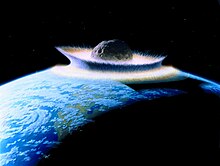Portal:Apocalyptic fiction
Apocalyptic fiction is a sub-genre of science fiction that is concerned with the end of civilization due to a potentially existential catastrophe such as nuclear warfare, pandemic, extraterrestrial attack, impact event, cybernetic revolt, technological singularity, dysgenics, supernatural phenomena, divine judgment, climate change, resource depletion or some other general disaster.

Alien invasion
editThe alien invasion is a common theme in science fiction stories and film, in which extraterrestrial life invades Earth either to exterminate and supplant human life, enslave it under a colonial system, harvest humans for food, steal the planet's resources, or destroy the planet altogether.
- The Germ Growers, 1892 by Robert Potter
- The War of the Worlds, 1898 by Herbert George Wells
- The Thing From—Outside, 1926 edition by George Allan England, original: Science and Invention, April 1923
- The Hanging Stranger, 1953 by Philip Kindred Dick
Armageddon
editArmageddon is, according to the Bible, the site of a battle during the end times, variously interpreted as either a literal or symbolic location. Used here to group fiction representing a final, apocalyptic war.
- The Food of the Gods and How It Came to Earth, 1904 by Herbert George Wells
- The Absolute at Large (1922) by Karel Čapek, translated by Šárka B. Hrbková (1927)
- The War of the Giants, 1931 by Fletcher Pratt
Cybernetic revolt
edit- The Machine Stops, 1909 by Edward Morgan Forster
- R. U. R. (Rossum's Universal Robots), 1921 theatre play by Karel Čapek
- The Mentanicals, 1949 edition by George Henry Weiss, originally published in Amazing Stories, April 1934
- Second Variety, 1953 by Philip Kindred Dick
Dying Earth
editThe Dying Earth subgenre is a sub-category of science fiction or science fantasy which takes place in the far future at either the end of life on Earth or the End of Time, when the laws of the universe themselves fail. Themes of world-weariness, innocence (wounded or otherwise), idealism, entropy, (permanent) exhaustion/depletion of many or all resources (such as soil nutrients), and the hope of renewal tend to pre-dominate.
- Darkness by George Gordon Byron, Lord Byron
- The Time Machine, 1895 by Herbert George Wells
- The House on the Borderland, 1908 by William Hope Hodgson
- The Night Land, 1912 by William Hope Hodgson
- Till A' the Seas, 1935 by Howard Phillips Lovecraft and R. H. Barlow
Ecological catastrophe
edit- The Doom of the Great City (1880) William Delisle Hay
- The Poison Belt, 1913 by Arthur Conan Doyle
- Omega, 1949 edition by Amelia Reynolds Long, originaly published in Amazing Stories, July 1932.
Impact event
editAn impact event is the collision of a large meteorite, asteroid, comet, or other celestial object with the Earth or another planet. Impact events have been a plot and background element in science fiction since knowledge of real impacts became established in the scientific mainstream.
- The Conversation of Eiros and Charmion, 1839 by Edgar Allan Poe
- The Star, 1897 by Herbert George Wells
- A Runaway World, 1926 by Clare Winger Harris
Unexplained extinction
edit- "The Man Who Lived" by . in Weird Tales, 36 (1) (September-October 1941)
Pandemic
edit- The Last Man, 1826 by Mary Wollstonecraft Shelley
- The Scarlet Plague, 1912 by Jack London
Post-apocalyptic fiction
edit- After London, 1885 by Richard Jefferies
- The Purple Cloud, 1901 by Matthew Phipps Shiel
- In the Days of the Comet, 1906 by Herbert George Wells
- Valhalla, 1907 by George Long
- The Scarlet Plague, 1912 by Jack London
- After Armageddon, 1932 by George Henry Weiss
- The Defenders, 1953 by Philip Kindred Dick
- Second Variety, 1953 by Philip Kindred Dick